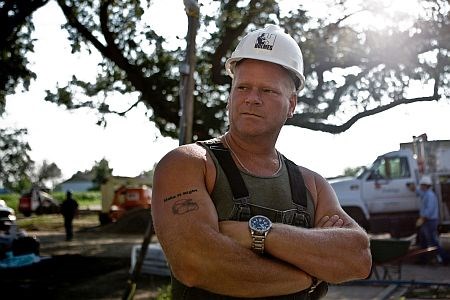Don’t let his signature brown overalls fool you: these days, Mike Holmes is all about green.
Labeling himself “a pretty green guy,” Canada’s reigning celebrity king of contractors becomes enthusiastic as he points out the many problems facing homebuilders – from mould to marketing. It all could be solved by a simple shift towards being environmentally conscious, he says.
“We’re doing a lot of things wrong, and we’re not stepping back and recognizing it and making changes,” says Holmes.
“I think that’s a huge mistake, on not only the contractors’ and builders’ side, but in ourselves and on our own. We should be making these demands, and I think once we know, that’s when we start to say, ‘Hey, I don’t want this.’”
These days, Holmes is a busy man, not only working on his hit HGTV show “Holmes on Homes,” but also on a new series, “Holmes Inspections,” and a Kitchener/Waterloo business of the same name. This fall, he’s also overseeing the creation of “Holmes Magazine.”
However, the man who worked with Brad Pitt to rebuild homes in New Orleans is taking time out of his busy schedule to make two green-themed presentations as keynote speaker at the Sudbury Living Lifestyle & Home Show, to be held at the Radisson Hotel on Oct. 18.
Between the industry’s past accomplishments and positive steps for the future, Holmes insists he’ll have no shortage of things to teach attendees.
“More than anything, I want to help educate people on green and understand what they should be doing with their homes, what they need to be doing and understand why.” This includes creating an awareness about such the dangers of volatile organic compounds (VOC) contained within some types of paint, carpeting and caulking. Through a phenomenon known as off-gassing, these chemicals are released into the air, making homeowners sick.
These and other unsustainable building practices aren’t necessarily the fault of builders and contractors, who often do whatever they were taught and aren’t always aware of alternative products or techniques, says Holmes.
The problem often lies in the lack of availability of safer, greener products on store shelves. “Demand dictates what’s on order,” he says, adding that safe, high-quality glues, caulking and drywall can become the norm if people would simply begin asking for it.
While many contrary voices have argued that taking a greener approach can make for bigger price tags, Holmes skewers this perception of higher costs as “a false barrier.” If done properly, costs need rise no more than 3 per cent on an average home, if any increase is to be had at all.
What’s more, even the simplest solutions can offer long-term economical benefits.
Laughing at the so-called “25-year guarantee” offered through shingles, Holmes says a basic steel roof will last homeowners 50 years. Of course, anyone who’s seen Holmes’ burly frame rip into unsafe home installations knows he doesn’t just talk the talk. His passion for green will soon translate into concrete action as he moves ahead with his vision of “Holmes Communities.” In Alberta areas that he’s literally building from the ground up.
Due to break ground this fall, every aspect of the “green village” pilot project will be built at above LEED Platinum, from the houses to the schools, from the sewage systems to the street lights.
Streets, sidewalks and driveways will be heated by geothermal technology, doing away with the need for winter salting or the danger of frost-and-heave.
The homes themselves will never mould or burn, and will provide constant payback to owners through solar technology and other sustainable systems.
The cost? Just 15 per cent higher than the average home, a number which can be reduced by shrinking the floor plan to suit individual budgets.
In time, the Holmes Communities initiative will spread across Canada, with preliminary plans to begin looking at southern Ontario.
“If I haven’t pissed off the developers yet, I’m going to,” says Holmes. “I’m not trying to, and if anything what I’m try to tell them – and I’ve said it for years – is, ‘Come on guys, lead the path. Be the ones that do it right and brag about it.’ But yet, no, they just don’t want to do it, so I’m doing it.”
The project also represents an opportunity to bring in young apprentices and to teach them about building in a sustainable way, something he feels is lacking in the nation’s educational institutions.
Holmes says he hopes the move will also help drive a hunger for knowledge among contractors and developers, who shouldn’t be afraid to constantly learn about new ways of building.
“Being honest and saying, ‘I don’t know how to do this but I’ll find out’ really does work,” he says. “Educating yourself really is the key to anything.”




